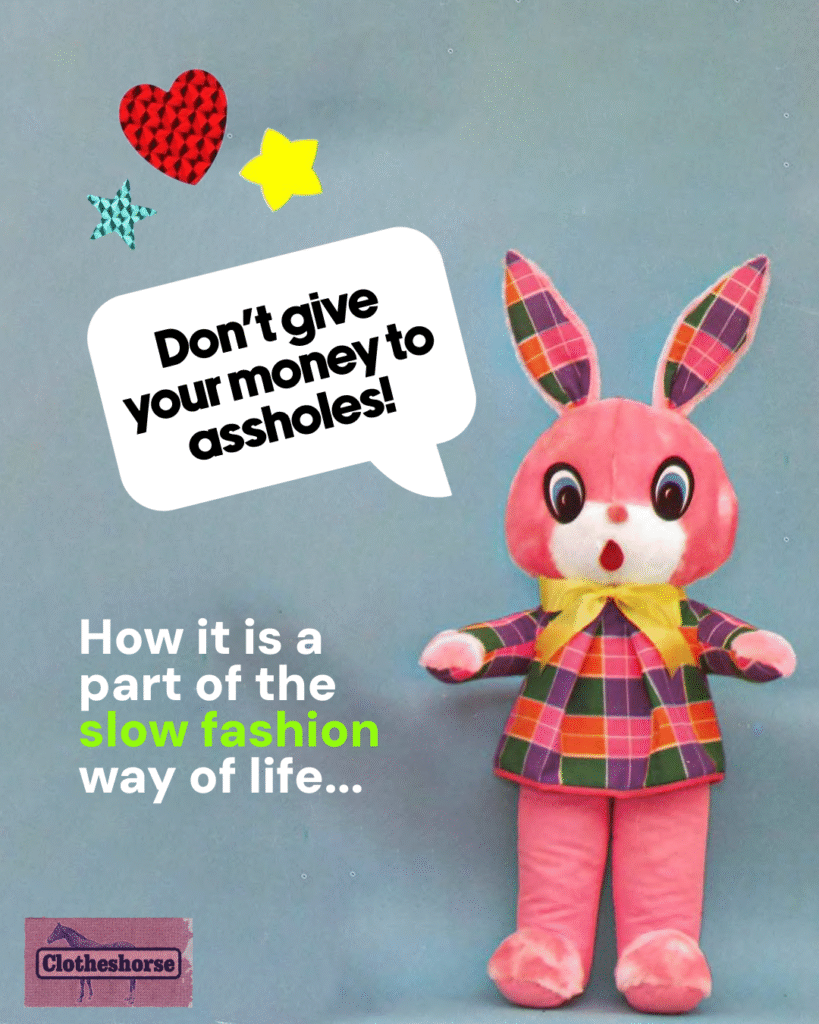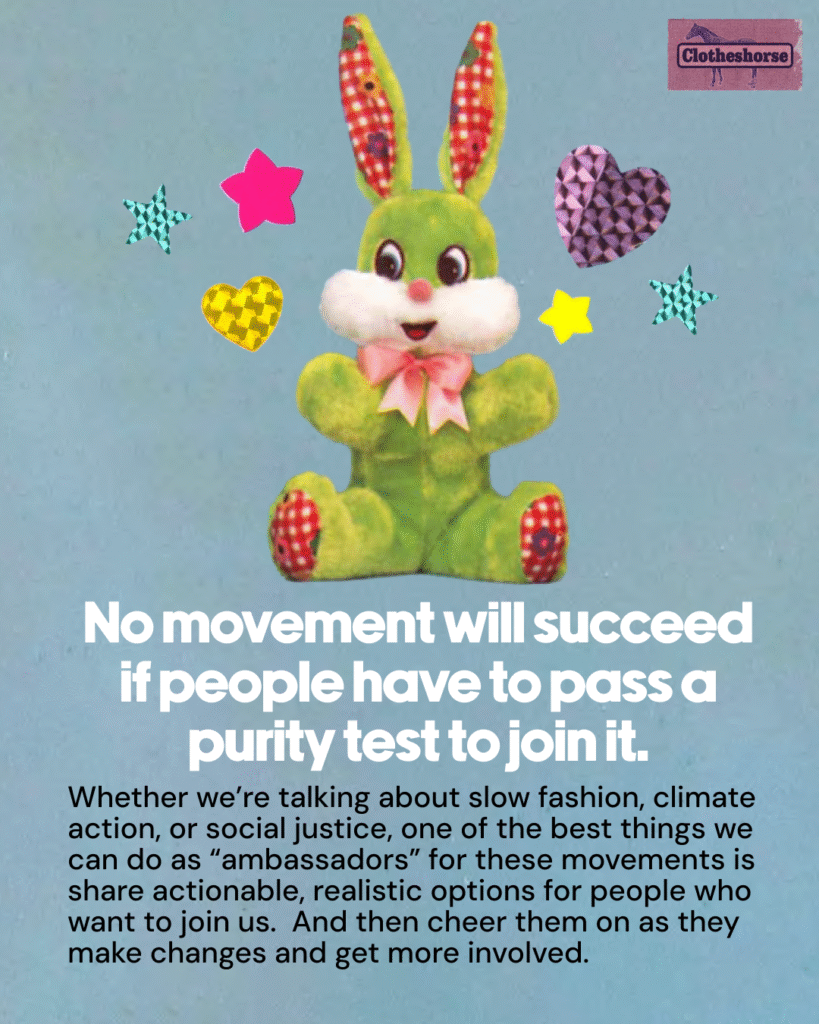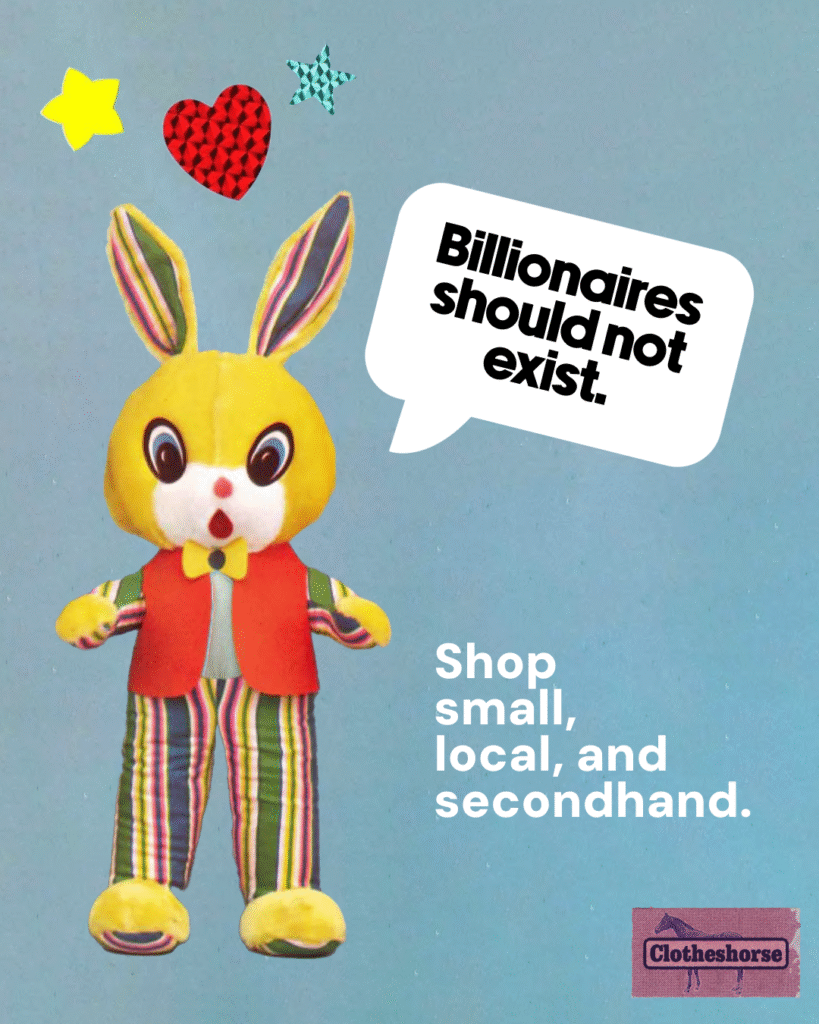
Yeah, it’s a catchy phrase but it also meaningful to me in a major way.
Back in 2020, I was lost my job in the early months of the pandemic. One of the last things I was required to do before being laid off? Cancel every order that my employer had placed for new product, whether it was in production, on the plane flying across the ocean, or already on its way to the warehouse.
It felt really unethical on many levels. My employer often bragged about having $100 million in cash in the bank at any moment. Yet here we were, cancelling orders that this company could 100% afford. Small businesses went under. People lost their jobs. Garment workers didn’t get paid for work they had already done. The ethical implications were massive. All because this company was prioritizing preservation of profit over people.
A week after I was officially let go with two weeks of severance and one week of health insurance, I was bombarded with articles trumpeting my former employer’s “surprise” profit for that quarter.
That profit was comprised entirely of lost wages: store employees who had been furloughed for months, garment workers who went unpaid for the work they had already done when orders were cancelled, and corporate workers like myself who had been furloughed and laid off.
So many people suffered so that company could have a higher stock price. My family’s struggles were small in comparison to the global impact of my employer’s decisions, but times were difficult nonetheless: we moved out of the city because we could no longer afford the rent, my daughter had to put off college for a few years, I stopped refilling my medication (and at one point I did some minor dental surgery on myself….don’t ask).
The more I thought about it, the more I saw that this company did not share my values.
I thought about the internal company culture of classism, fat phobia, and racism. I remembered the horrible ways I had seen the company treat employees at all levels. I was even bothered by how the company didn’t offer real (reusable) dishes in the cafeteria, only disposable takeout packaging because it was cheaper than dishes/dishwashers. I recognized that every cent I spent with that company was support for its way of doing business, essentially casting a vote in favor of profits over everything else.
I told my husband and daughter, “We will never give a dime to that company ever again. We don’t give money to assholes.”
And guess what? We haven’t. Even almost five years later…
Sometimes it’s just really important to hold a grudge.
It’s easy for me to skip my former employer because they make low quality fast fashion with a high markup. I can find better things elsewhere.
“Don’t give your money to assholes” can be one of the easiest components of the slow fashion way of life to follow. If you don’t like what a business does or sells, you skip it, right?
It’s not always that simple. There are larger issues of access, price, and availability that can make it more difficult. Sometimes you will have to shop from a business that doesn’t share your values because it’s the only option. Or maybe the options are more complicated. Let’s break it down…
A recent example of this is Sticker Mule, a company that prints stickers for artists and brands.
I have ordered stickers from Sticker Mule in the past. But last year (thanks to Reddit) I learned that the owner of the company was a major Donald Trump supporter.
I knew that I would not want to order from Sticker Mule in the future because ultimately, every purchase I make with that company could potentially fund donations and support for Donald Trump.
Yeah, that company doesn’t get my money.
So I started looking for other options.
Fortunately there are many other companies out there offering similar services at similar prices (and maybe even better quality).
I want to remind you that we can’t let perfection be the enemy of progress.
For example, I don’t love Walmart for about one million reasons. To me, Walmart is the original destroyer of small businesses. So I try to skip it as often as possible.
Maybe you’re on a road trip, your partner comes down with norovirus, and the only option for medicine (and a thermometer) is Walmart. This happened to me earlier this year!
Maybe Walmart is the most affordable grocery option where you live. Or you need window blinds and they have the only ones you can afford nearby.
These systems aren’t set up for us to easily live our values. In fact, the odds are stacked against us, as big companies (like Walmart) make it really difficult for thoughtful, ethical businesses to grow and thrive (or exist at all).
Whether SHEIN is the only brand that has clothes in your size that you can afford (and want to wear)…or Walmart is the only place to get groceries…be gentle with yourself and do what you need to do. I often worry that the pressure for “purity” that we see/feel on social media actually ends up frustrating, discouraging…and ultimately, disconnecting us from working for a better future.
BUT don’t over shop. Don’t buy things you really don’t need or wear. Reining in your spending has major impact, too, because companies like SHEIN and Walmart only thrive when we are all buying a ton of stuff we don’t really need.
Buying less is very powerful, too.

Your list may vary (because values are extremely personal):
Amazon, Walmart, Target, SHEIN, Temu…basically any company with opaque supply chains and labor issues.
Companies like Trader Joes and Starbucks who engage in anti-union tactics.
Brands who refused to #PayUp on orders cancelled in 2020: all the URBN brands, American Eagle, Aerie, TJ Maxx, Home Goods, Marshalls, Ross, Kohl’s, Forever 21, and more.
Any company with an obvious political stance that does not fit my own values. Yeah, that means I won’t be renting a truck from the U-Haul place in my town with a massive Trump sign. Definitely not buying cookies from this terrible viral cookie place here in Lancaster County.
That’s just the beginning of my list. Most importantly, I try to shop secondhand first. And when I can’t do that, I start by looking for something local from a small business.
My thought process as I make decisions about where and when to shop:
First things first: do I really need this? Is it more of a want?
If it’s clothing: why do I need it? When and how will I wear it? Am I prepared to care for it properly and mend it when necessary?
If it’s not clothing, where will it live in my home? Can I see myself using this thing for a long time?
Can I find it secondhand? Often I’ll look online and in person for this item, for days, weeks, even months (if it is not urgent).
If I can’t find it secondhand, can I find it from a local small business? That means my money will stay within the community.
If I can’t find it locally, can I find it elsewhere from a small business? My money has more immediate impact with a small business.
If I still can’t find it, but definitely need it…then I’ll buy it elsewhere.

The last thing I want to add here: odds are good that your favorite small business isn’t planning on buying an election, gutting the federal government, or blasting rockets into the atmosphere. So shop small when you can!
If you want to share your opinion/additional thoughts on the subjects we cover in each episode, feel free to email, whether it’s a typed out message or an audio recording: [email protected]
Slow Fashion Academy is a size-inclusive sewing and patternmaking studio based in Philadelphia, Pennsylvania. Designer and fashion professor Ruby Gertz teaches workshops for hobbyists and aspiring designers, so that anyone can learn the foundational skills of making, mending, and altering their own clothes. Ruby also provides professional design and patternmaking services to emerging slow fashion brands, and occasionally takes commissions for custom garments and costume pieces. She has also released several PDF sewing patterns for original designs under her brands Spokes & Stitches, and Starling Petite Plus. Check the schedule for upcoming workshops, download PDF sewing patterns, and learn about additional sewing and design services at www.slowfashion.academy.
Thumbprint is Detroit’s only fair trade marketplace, located in the historic Eastern Market. Our small business specializes in products handmade by empowered women in South Africa making a living wage creating things they love like hand painted candles and ceramics! We also carry a curated assortment of sustainable/natural locally made goods. Thumbprint is a great gift destination for both the special people in your life and for yourself! Browse our online store at thumbprintdetroit.com and find us on instagram @thumbprintdetroit.
Picnicwear: a slow fashion brand, ethically made by hand from vintage and deadstock materials – most notably, vintage towels! Founder, Dani, has worked in the industry as a fashion designer for over 10 years, but started Picnicwear in response to her dissatisfaction with the industry’s shortcomings. Picnicwear recently moved to rural North Carolina where all their clothing and accessories are now designed and cut, but the majority of their sewing is done by skilled garment workers in NYC. Their customers take comfort in knowing that all their sewists are paid well above NYC minimum wage. Picnicwear offers minimal waste and maximum authenticity: Future Vintage over future garbage.
Shift Clothing, out of beautiful Astoria, Oregon, with a focus on natural fibers, simple hardworking designs, and putting fat people first. Discover more at shiftwheeler.com
High Energy Vintage is a fun and funky vintage shop located in Somerville, MA, just a few minutes away from downtown Boston. They offer a highly curated selection of bright and colorful clothing and accessories from the 1940s-1990s for people of all genders. Husband-and-wife duo Wiley & Jessamy handpick each piece for quality and style, with a focus on pieces that transcend trends and will find a home in your closet for many years to come! In addition to clothing, the shop also features a large selection of vintage vinyl and old school video games. Find them on instagram @ highenergyvintage, online at highenergyvintage.com, and at markets in and around Boston.
St. Evens is an NYC-based vintage shop that is dedicated to bringing you those special pieces you’ll reach for again and again. More than just a store, St. Evens is dedicated to sharing the stories and history behind the garments. 10% of all sales are donated to a different charitable organization each month. New vintage is released every Thursday at wearStEvens.com, with previews of new pieces and more brought to you on Instagram at @wear_st.evens.
Deco Denim is a startup based out of San Francisco, selling clothing and accessories that are sustainable, gender fluid, size inclusive and high quality–made to last for years to come. Deco Denim is trying to change the way you think about buying clothes. Founder Sarah Mattes wants to empower people to ask important questions like, “Where was this made? Was this garment made ethically? Is this fabric made of plastic? Can this garment be upcycled and if not, can it be recycled?” Signup at decodenim.com to receive $20 off your first purchase. They promise not to spam you and send out no more than 3 emails a month, with 2 of them surrounding education or a personal note from the Founder. Find them on Instagram as @deco.denim.
The Pewter Thimble Is there a little bit of Italy in your soul? Are you an enthusiast of pre-loved decor and accessories? Bring vintage Italian style — and history — into your space with The Pewter Thimble (@thepewterthimble). We source useful and beautiful things, and mend them where needed. We also find gorgeous illustrations, and make them print-worthy. Tarot cards, tea towels and handpicked treasures, available to you from the comfort of your own home. Responsibly sourced from across Rome, lovingly renewed by fairly paid artists and artisans, with something for every budget. Discover more at thepewterthimble.com
Blank Cass, or Blanket Coats by Cass, is focused on restoring, renewing, and reviving the history held within vintage and heirloom textiles. By embodying and transferring the love, craft, and energy that is original to each vintage textile into a new garment, I hope we can reteach ourselves to care for and mend what we have and make it last. Blank Cass lives on Instagram @blank_cass and a website will be launched soon at blankcass.com.
Vagabond Vintage DTLV is a vintage clothing, accessories & decor reselling business based in Downtown Las Vegas. Not only do we sell in Las Vegas, but we are also located throughout resale markets in San Francisco as well as at a curated boutique called Lux and Ivy located in Indianapolis, Indiana. Jessica, the founder & owner of Vagabond Vintage DTLV, recently opened the first IRL location located in the Arts District of Downtown Las Vegas on August 5th. The shop has a strong emphasis on 60s & 70s garments, single stitch tee shirts & dreamy loungewear. Follow them on instagram, @vagabondvintage.dtlv and keep an eye out for their website coming fall of 2022.
Country Feedback is a mom & pop record shop in Tarboro, North Carolina. They specialize in used rock, country, and soul and offer affordable vintage clothing and housewares. Do you have used records you want to sell? Country Feedback wants to buy them! Find us on Instagram @countryfeedbackvintageandvinyl or head downeast and visit our brick and mortar. All are welcome at this inclusive and family-friendly record shop in the country!
Located in Whistler, Canada, Velvet Underground is a “velvet jungle” full of vintage and second-hand clothes, plants, a vegan cafe and lots of rad products from other small sustainable businesses. Our mission is to create a brand and community dedicated to promoting self-expression, as well as educating and inspiring a more sustainable and conscious lifestyle both for the people and the planet. Find us on Instagram @shop_velvetunderground or online at www.shopvelvetunderground.com
Selina Sanders, a social impact brand that specializes in up-cycled clothing, using only reclaimed, vintage or thrifted materials: from tea towels, linens, blankets and quilts. Sustainably crafted in Los Angeles, each piece is designed to last in one’s closet for generations to come. Maximum Style; Minimal Carbon Footprint.
Salt Hats: purveyors of truly sustainable hats. Hand blocked, sewn and embellished in Detroit, Michigan.
Republica Unicornia Yarns: Hand-Dyed Yarn and notions for the color-obsessed. Made with love and some swearing in fabulous Atlanta, Georgia by Head Yarn Wench Kathleen. Get ready for rainbows with a side of Giving A Damn! Republica Unicornia is all about making your own magic using small-batch, responsibly sourced, hand-dyed yarns and thoughtfully made notions. Slow fashion all the way down and discover the joy of creating your very own beautiful hand knit, crocheted, or woven pieces. Find us on Instagram @republica_unicornia_yarns and at www.republicaunicornia.com.
Cute Little Ruin is an online shop dedicated to providing quality vintage and secondhand clothing, vinyl, and home items in a wide range of styles and price points. If it’s ethical and legal, we try to find a new home for it! Vintage style with progressive values. Find us on Instagram at @CuteLittleRuin.